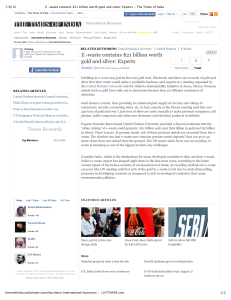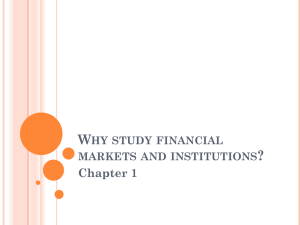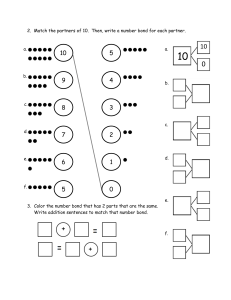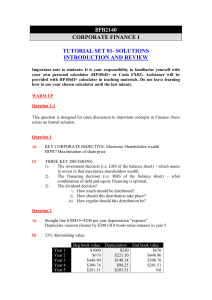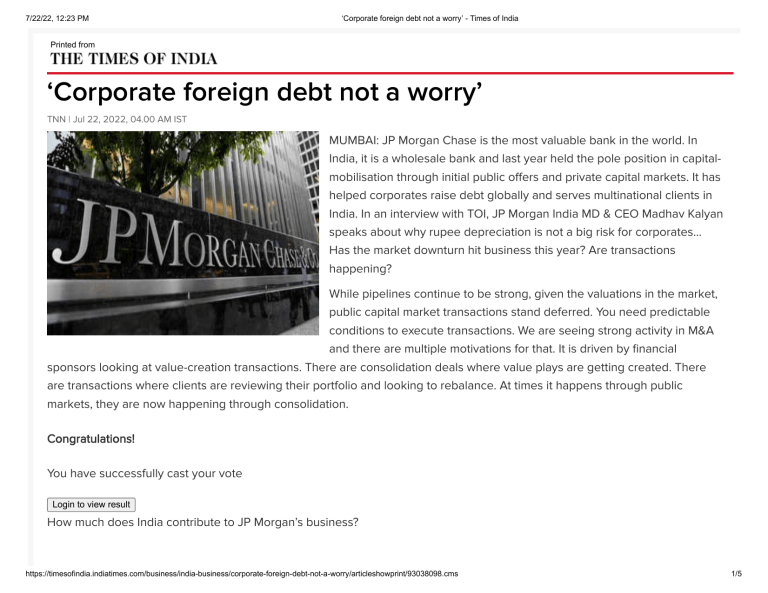
7/22/22, 12:23 PM ‘Corporate foreign debt not a worry’ - Times of India Printed from ‘Corporate foreign debt not a worry’ TNN | Jul 22, 2022, 04.00 AM IST MUMBAI: JP Morgan Chase is the most valuable bank in the world. In India, it is a wholesale bank and last year held the pole position in capitalmobilisation through initial public offers and private capital markets. It has helped corporates raise debt globally and serves multinational clients in India. In an interview with TOI, JP Morgan India MD & CEO Madhav Kalyan speaks about why rupee depreciation is not a big risk for corporates... Has the market downturn hit business this year? Are transactions happening? While pipelines continue to be strong, given the valuations in the market, public capital market transactions stand deferred. You need predictable conditions to execute transactions. We are seeing strong activity in M&A and there are multiple motivations for that. It is driven by financial sponsors looking at value-creation transactions. There are consolidation deals where value plays are getting created. There are transactions where clients are reviewing their portfolio and looking to rebalance. At times it happens through public markets, they are now happening through consolidation. Congratulations! You have successfully cast your vote Login to view result How much does India contribute to JP Morgan’s business? https://timesofindia.indiatimes.com/business/india-business/corporate-foreign-debt-not-a-worry/articleshowprint/93038098.cms 1/5 7/22/22, 12:23 PM ‘Corporate foreign debt not a worry’ - Times of India India is a very important market for JP Morgan and we continue to invest in India and China. For us, these markets offer the highest potential and create the largest opportunities just because of their global linkages. Corporate India has also become increasingly international over the last few years. We do not share numbers for the Indian market separately. As our chairman Jamie Dimon said, India is a several-hundred-year bet for JP Morgan. Will the rupee depreciation have a major impact on business and economy? I think we are doing all the right things in an environment that is seeing the dollar strengthen and most emerging & developed market currencies depreciate. A calibrated depreciation is both necessary and acts as a shock absorber to retain our competitiveness. So, I think the way the Reserve Bank of India is managing the depreciation in a gradual and calibrated manner is necessary. If you look at the trade-weighted currency, that’s largely stayed flat, which means we continue to be competitive. Inflation is something that monetary policy needs to combat, and the approach to front-load action to anchor expectations is the right thing to do. I think both the approaches — on the currency side to be calibrated in the depreciation process and on the interest rate side to front-load action to deal with inflation — are absolutely the right ways to approach the situation. A big chunk of external commercial borrowings (ECBs) is coming up for renewal for corporates. Will this cause a problem? Many corporates have enough cash to deal with the repayments using either the domestic bond markets or other sources of capital like bank finance or syndicated loans. Both corporate and bank balance sheets are at their healthiest levels at this point of time. With corporates having deleveraged, there is a natural buffer available. The international bond markets too have opened up for Indian investors. Maturing ECBs are not something that we worry about. The government has rolled back most of the windfall gains tax. Will this help? It will augur well on multiple fronts. It helps exports and it enables corporate leverage international prices for corporations. When we are looking to disinvest stakes in state-owned entities, removing restrictions that come in their way of accessing the international markets make it a little more attractive.Is there fear of the rising twin deficit putting pressure on credit rating? https://timesofindia.indiatimes.com/business/india-business/corporate-foreign-debt-not-a-worry/articleshowprint/93038098.cms 2/5 7/22/22, 12:23 PM ‘Corporate foreign debt not a worry’ - Times of India https://timesofindia.indiatimes.com/business/india-business/corporate-foreign-debt-not-a-worry/articleshowprint/93038098.cms 3/5 7/22/22, 12:23 PM ‘Corporate foreign debt not a worry’ - Times of India No international rating agency has even come close to suggesting a rating watch. Besides, the quality of fiscal deficit in India is different. We are using it for government spending and consequently reviving the private capex cycle. India has been working to be part of global bond indices. But some feel that the passive funds might turn out to be hot money... Passive money does not tend to be hot money. If you have a certain weightage in an index, they (passive funds) will continue to be invested around that. As long as the weightage does not change for any reason inherent to us, these flows tend to be more stable and they bring stability to the bond markets. India has over $600 billion that comes into equity markets. Our bond markets do not attract more than $40-50 billion. Once index inclusion happens, it will bring fairly stable flows from investors who are measured against the index. A lot of the work has been done and much of the building blocks are already in place to make India part of global bond indices. The RBI has allowed rupee invoicing and settlement in global trade. How do you see this? The ability to invoice in rupees is not new. The biggest users for rupee invoicing are multinational corporations that supply to their subsidiaries in India. These MNCs have been doing rupee invoicing to measure the performance of their subsidiary without the element of exchange risk. All the currency risks can then be managed in a centralised treasury. There are countries that do bilateral trade with us like in oil and would like to trade in our currency. Third, there has always existed an Asian Clearing Union mechanism for SAARC countries and they may want to use rupees for the region. Do you think there is a need for a special scheme to attract dollar flows? The US in tackling inflation and trying to deal with the fact that there are negative real rates. The market is pricing in a 75-100 basis points (0.75-1 percentage point) increase by the Fed. NRIs can choose between the US and India to invest. Some banks have already increased FCNR rates by 85bps and this will attract a certain amount of flows. Last time the FCNR(B) deposit scheme was combined with a swap window, where banks could exchange dollars with the RBI, it resulted in attracting $30 https://timesofindia.indiatimes.com/business/india-business/corporate-foreign-debt-not-a-worry/articleshowprint/93038098.cms 4/5 7/22/22, 12:23 PM ‘Corporate foreign debt not a worry’ - Times of India billion. This time around, reserves are quite robust, and so a swap window may not be needed. Also, with the ECB book coming up for renewal, banks can deploy whatever foreign exchange they raise. https://timesofindia.indiatimes.com/business/india-business/corporate-foreign-debt-not-a-worry/articleshowprint/93038098.cms 5/5
